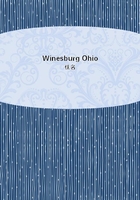
第15章 THE PHILOSOPHER(2)
"My father had been insane for a number of years. He was in an asylum over at Dayton, Ohio. There you see I have let it slip out! All of this took place in Ohio, right here in Ohio. There is a clew if you ever get the notion of looking me up.
"I was going to tell you of my brother. That's the object of all this. That's what I'm getting at. My brother was a railroad painter and had a job on the Big Four. You know that road runs through Ohio here. With other men he lived in a box car and away they went from town to town painting the railroad property-switches, crossing gates, bridges, and stations.
"The Big Four paints its stations a nasty orange color. How I hated that color! My brother was al- ways covered with it. On pay days he used to get drunk and come home wearing his paint-covered clothes and bringinghis money with him. He did not give it to mother but laid it in a pile on our kitchen table.
"About the house he went in the clothes covered with the nasty orange colored paint. I can see the picture. My mother, who was small and had red, sad-looking eyes, would come into the house from a little shed at the back. That's where she spent her time over the washtub scrubbing people's dirty clothes. In she would come and stand by the table, rubbing her eyes with her apron that was covered with soap-suds.
"'Don't touch it! Don't you dare touch that money,' my brother roared, and then he himself took five or ten dollars and went tramping off to the saloons. When he had spent what he had taken he came back for more. He never gave my mother any money at all but stayed about until he had spent it all, a little at a time. Then he went back to his job with the painting crew on the railroad. After he had gone things began to arrive at our house, groceries and such things. Sometimes there would be a dress for mother or a pair of shoes for me.
"Strange, eh? My mother loved my brother much more than she did me, although he never said a kind word to either of us and always raved up and down threatening us if we dared so much as touch the money that sometimes lay on the table three days.
"We got along pretty well. I studied to be a minis- ter and prayed. I was a regular ass about saying prayers. You should have heard me. When my fa- ther died I prayed all night, just as I did sometimes when my brother was in town drinking and going about buying the things for us. In the evening after supper I knelt by the table where the money lay and prayed for hours. When no one was looking I stole a dollar or two and put it in my pocket. That makes me laugh now but then it was terrible. It was on my mind all the time. I got six dollars a week from my job on the paper and always took it straight home to mother. The few dollars I stole from my brother's pile I spent on myself, you know, for trifles, candy and cigarettes and such things.
"When my father died at the asylum over at Day- ton, I went over there. I borrowed some money from the man for whom I worked and went on the train at night. It was raining. In the asylum they treated me asthough I were a king.
"The men who had jobs in the asylum had found out I was a newspaper reporter. That made them afraid. There had been some negligence, some care- lessness, you see, when father was ill. They thought perhaps I would write it up in the paper and make a fuss. I never intended to do anything of the kind.